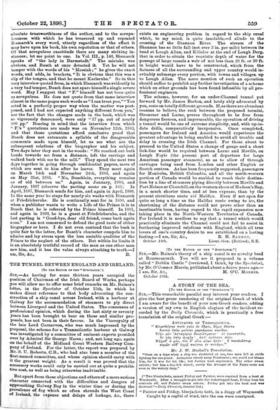footing.ŌĆöI am, Sir, &c., R. H. SANKEY, October 1Sth. Lieut.-Gen.
(Retired), R.E.
[To THE EDITOR OF THE "SPECTATOR."] SIR,ŌĆöMr. Baines's theory of a ship canal is no novelty bred at Bournemouth. You will see it proposed in a volume called "Dublin Castle" (reviewed, I think, by the Spectator), by Mr. O'Connor Morris, published about a dozen years ago.ŌĆö I am, Sir, &c., M. O'C. MORRIS. October 19th.
A STORY OF THE SEA.
ITO THE EDITOR OF THE " SPECTATOR.1
SinŌĆ×ŌĆöThis remarkable parallel may interest your readers. I give the best prose rendering of the original Greek of which I am aware for the benefit of your non-Greek readers, adding a version of my own in English elegiacs of the incident re- corded by the Daily Chronicle, which is practically a free
translation of the original Greek :ŌĆö
.A.YrIPATER OF THESSALONTCA.
" KAaoileicrns 1rcri4 vnbs iv Ravi, pip eEPTO Sicro-ol p.o6v77s isapvcip.eroi o-av;bos. Tine 'ayvaripas. rietcficrTparOv 01 PEALE071741,, 'yap tin4p Oxils Oa' 1)./iA.71SE Wad'6 i/EF, vbv 8' sac ,6 WV 13.A4S ŌĆó TaVO.XeUTTOp scnpvoird" 467 watisvai iv -ffexciri."
Mr. .T. W. Mackairs Translation.
"Once on a time when a ship was shattered at sea, two men fell at strife fighting for one plank. Antagoras struck away Pisistratns; one could not blame him, for it was for his life; but Justice took cognisance. The other Mill ashore; bat him a dog-fish seized; surely the Avenger of the Fates rests not even in the watery deep."










































 Previous page
Previous page